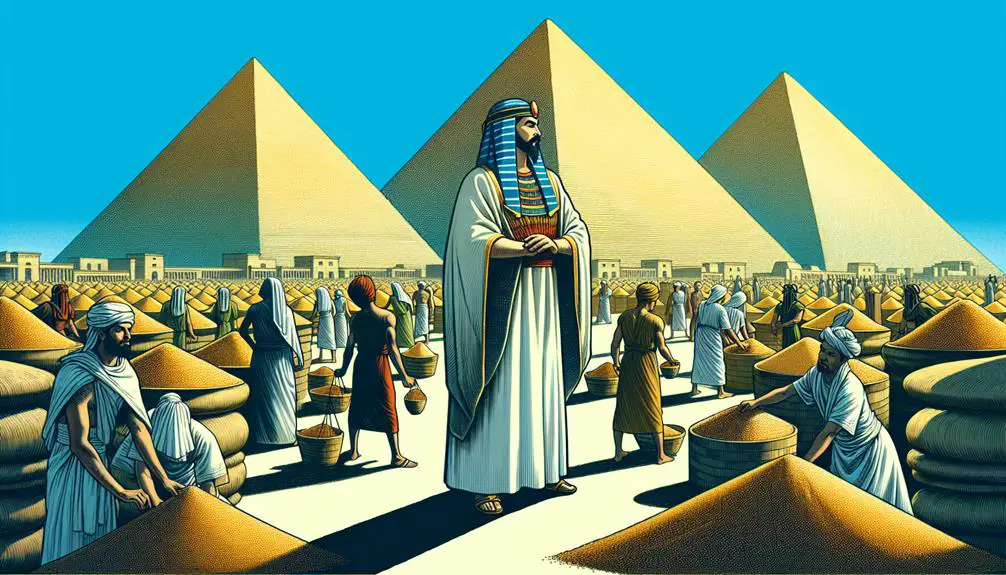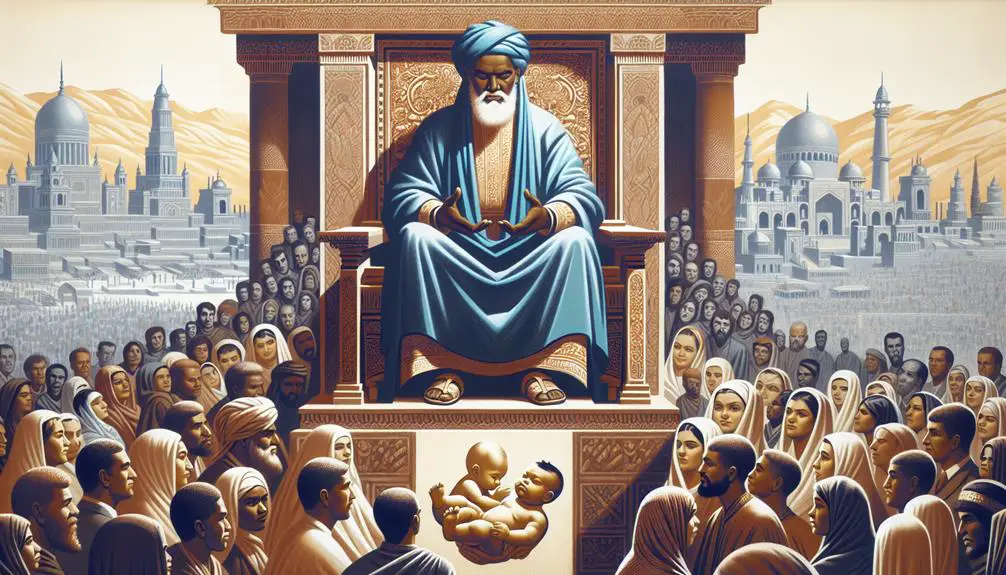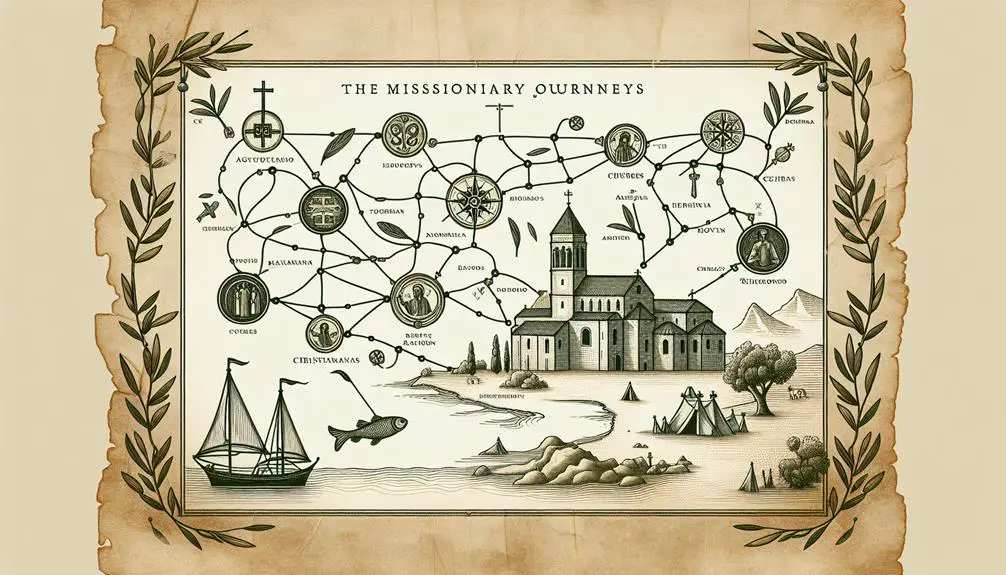Gain insights into timeless leadership strategies from the Bible, exploring how ancient wisdom can revolutionize modern administration practices.

Administration in the Bible
You've probably heard theories about ancient leadership and management, but have you considered the Bible's take on administration? From Joseph's astute resource management in Egypt to Moses' innovative judicial delegation, the Bible offers a treasure trove of insights on governance and leadership that still resonate today.
Figures like Solomon and Nehemiah weren't just spiritual leaders; they were adept administrators whose strategies could enlighten modern management practices. As you explore these biblical examples, you'll find that the principles of effective leadership and organization are as timeless as the texts themselves, presenting a compelling case for the relevance of ancient wisdom in today's world.
Key Takeaways
- Biblical leaders like Joseph and Solomon showcased effective resource management and strategic leadership in governance.
- Diplomatic strategies and alliances were crucial for peace, cultural exchanges, and economic growth in biblical narratives.
- Figures such as Daniel highlighted the importance of ethical leadership and integrity in unfamiliar environments.
- The establishment of ecclesiastical structures by Paul emphasized the significance of diverse spiritual gifts and communal unity in church governance.
Joseph's Resource Management

In the biblical narrative, Joseph's adept management of Egypt's resources during seven years of abundance and subsequent famine exemplifies strategic foresight and efficient administration. His approach to grain storage and famine preparation offers a timeless lesson in proactive planning and the critical importance of resource allocation. Joseph's initiative to stockpile vast amounts of grain during the years of plenty directly mitigated the impacts of the impending scarcity, underscoring the value of anticipatory governance and the strategic reserve of essential commodities.
You'll observe that Joseph's methodology wasn't merely about accumulation but also involved a sophisticated system of distribution. His administration effectively rationed the stored grain to sustain the Egyptian population and neighboring regions throughout the seven years of famine. This not only averted a catastrophic food crisis but also stabilized the socio-economic conditions, preventing widespread destitution and social unrest. The narrative highlights the pivotal role of administrative acumen in disaster preparedness and response, illustrating how well-orchestrated resource management can shield societies from the severest consequences of unpredictable adversities.
Furthermore, Joseph's strategy encompassed more than just immediate crisis mitigation. It facilitated long-term economic stability and fostered international cooperation, as Egypt became a center for grain distribution to other affected areas. This aspect of his administration emphasizes the importance of foresight in policy-making and the benefits of maintaining surplus reserves for emergency situations.
Analyzing Joseph's execution of grain storage and famine preparation, you're prompted to reflect on the principles of effective administration that transcend time. His story is a compelling study in the necessity of strategic planning, resourcefulness, and the foresight required for successful governance.
Moses' Judicial Delegation

You'll find that Moses' approach to judicial delegation serves as a pivotal example of administrative wisdom in a biblical context.
By selecting capable leaders and distributing judicial responsibilities, he not only enhanced governance efficiency but also established a model for effective leadership and organization.
This analysis will explore how his methods impacted the administrative structure of his time and offer insights into their relevance today.
Choosing Capable Leaders
Choosing capable leaders, Moses' judicial delegation exemplifies a pivotal moment in biblical administration, showcasing the importance of wisdom and discernment in leadership selection. This historical account offers profound insights into the essential leadership traits and decision-making processes crucial for effective governance.
To understand the depth of Moses' approach, consider the following:
- Assessment of Qualifications: Moses sought individuals with specific attributes—fear of God, trustworthiness, and hatred of dishonest gain.
- Delegation of Authority: By distributing judicial responsibilities, Moses ensured that leadership wasn't centralized, promoting efficiency and accountability.
- Mentorship and Guidance: Moses didn't merely appoint leaders; he provided ongoing support and counsel to maintain integrity and justice within the community.
This narrative underlines the timeless principle that choosing leaders with the right traits and processes is fundamental to successful administration.
Dividing Judicial Responsibilities
Having explored the criteria for selecting capable leaders, we now examine how Moses' judicial delegation effectively divided responsibilities among them, ensuring a more efficient and just system. This strategic division of judicial responsibilities was a significant legal reform that addressed the burgeoning needs of a growing community. By allocating cases based on complexity and significance, Moses' approach allowed Judges to specialize, enhancing their ability to adjudicate disputes with greater wisdom and fairness.
The delegation of judicial duties wasn't merely about reducing Moses' workload; it was a transformative shift towards a decentralized system of governance. This system empowered capable leaders to serve as Judges, each playing a vital role within the broader legal framework. Their roles were pivotal in interpreting laws, ensuring adherence, and rendering justice, which underscored the importance of legal reforms in sustaining social order and equity.
Impact on Governance Efficiency
By delegating judicial responsibilities, Moses significantly enhanced the governance efficiency within the community, streamlining the adjudication process and ensuring a more responsive legal system. This delegation had profound effects on governance:
- Taxation Principles: It laid the groundwork for equitable taxation by establishing a system where disputes could be resolved efficiently, ensuring fair contribution from all members of the community.
- Cultural Influences: The delegation reflected and reinforced cultural values of shared responsibility and communal decision-making, strengthening social cohesion.
- Administrative Efficiency: It reduced the burden on a single leader, allowing for a more distributed form of governance that could handle a growing population's needs more effectively.
This strategic move by Moses not only addressed immediate administrative challenges but also set a precedent for future governance structures, illustrating the enduring impact of thoughtful delegation.
Solomon's Wisdom in Leadership

You'll examine Solomon's wisdom in leadership through his judicial decisions, temple construction management, and diplomatic alliances strategy.
Each of these facets demonstrates Solomon's ability to blend spiritual discernment with practical governance.
This analysis reveals the complex layers of his administration and its impact on Israel's prosperity.
Solomon's Judicial Decisions
Solomon's judicial decisions, particularly his renowned judgment involving two mothers and a baby, exemplify his profound wisdom in leadership and governance. His capacity to effectively administer justice not only showcased his discernment but also solidified his standing as a sagacious ruler.
To understand Solomon's wisdom in governance:
- Dream Interpretation: His ability to interpret dreams was a testament to his divine wisdom, guiding his decisions and leadership.
- Marriage Diplomacy: Solomon used marriage as a tool for political alliances, ensuring peace and strengthening his kingdom's position.
- Judicial Insight: The case of the two mothers revealed his unique approach to uncovering the truth, demonstrating his shrewd judgment and the importance of psychological insight in governance.
These aspects highlight Solomon's multifaceted approach to leadership and administration in biblical times.
Temple Construction Management
Building on his reputation for wisdom, Solomon also undertook the monumental task of managing the construction of the Temple, a project that demanded exceptional leadership and organizational skills. Central to this endeavor were material sourcing and artisan recruitment, showcasing Solomon's strategic approach to project management.
Aspect |
Contribution to Project Success |
|---|---|
Material Sourcing |
Ensured high-quality materials were available for the construction, leveraging Solomon's extensive network and knowledge. |
Artisan Recruitment |
Gathered skilled craftsmen from diverse backgrounds to work on the Temple, emphasizing the importance of expertise in achieving excellence. |
This strategic management not only facilitated the successful construction of the Temple but also exemplified Solomon's wisdom in leadership, demonstrating an unparalleled ability to oversee complex projects by effectively managing resources and personnel.
Diplomatic Alliances Strategy
Harnessing his diplomatic acumen, Solomon established strategic alliances that significantly bolstered his leadership and the prosperity of his kingdom. His approach to diplomacy was multifaceted, involving:
- Marriage treaties, which not only secured peace but also facilitated cultural exchanges and strengthened political ties.
- Enemy negotiations, demonstrating his preference for peaceful resolutions over conflict, thereby enhancing his kingdom's security and stability.
- Trade agreements that opened up new routes and opportunities, enriching his realm and promoting economic growth.
Solomon's wisdom in leadership, particularly in forming diplomatic alliances, was a testament to his understanding of the complexities of international relations. His strategies in marriage treaties and enemy negotiations underscored a commitment to peace, prosperity, and the well-being of his people.
Nehemiah's Rebuilding Efforts

Nehemiah's efforts to reconstruct Jerusalem's walls in the 5th century BCE represent a pivotal moment in the administrative history of ancient Israel. His approach to wall repairs wasn't merely a physical act of rebuilding but also an exercise in administrative skill and community mobilization. Nehemiah's project faced significant hurdles, notably community opposition, which he navigated with strategic planning and a clear vision for Jerusalem's future.
Upon his arrival in Jerusalem, Nehemiah conducted a covert assessment of the city's walls. This initial step underscores the importance of understanding the scope of a project before mobilizing resources. He then presented his plan to the Jewish leaders, securing their support before proceeding. This move illustrates the critical role of stakeholder engagement in project management.
However, the endeavor quickly encountered resistance from neighboring communities who perceived the fortified Jerusalem as a threat. Nehemiah's response to this opposition was multifaceted. He bolstered the city's defenses and organized the workers into groups, assigning them specific sections of the wall. This not only expedited the repairs but also fostered a sense of ownership among the participants, enhancing their motivation.
Moreover, Nehemiah's leadership was characterized by his hands-on approach and his willingness to work alongside the people. This participatory leadership style not only accelerated the wall repairs but also strengthened the community's resolve against external threats.
In essence, Nehemiah's rebuilding efforts offer a rich case study in overcoming community opposition through strategic planning, stakeholder engagement, and effective leadership, providing valuable insights into ancient administrative practices.
The Apostles' Community Support

In the aftermath of Christ's ascension, the Apostles' efforts to support and expand the early Christian community exemplify a significant evolution in administrative and communal strategies within the nascent church. Faced with the daunting task of nurturing a fledgling faith in a skeptical and often hostile environment, the Apostles implemented a series of innovative practices aimed at fostering a sense of unity, support, and spiritual growth among believers. These practices not only facilitated the physical sustenance of the community but also laid the groundwork for its spiritual and administrative structure.
To paint a picture of how the Apostles achieved this, consider the following strategies they employed:
- Sharing possessions: In a radical departure from the prevailing societal norms, the early Christian community adopted a practice of voluntary communal living, where believers would sell their possessions and distribute the proceeds according to each member's need. This approach ensured no one was left wanting and exemplified the principles of brotherly love and mutual support that were core to the teachings of Jesus.
- Prayer meetings: Regular gatherings for prayer were central to the life of the early church. These meetings served not only as times of spiritual edification but also as opportunities for reinforcing the communal bonds and shared identity among believers.
- Teaching and discipleship: The Apostles devoted themselves to teaching the new converts, ensuring that the teachings of Jesus were accurately transmitted and that the community's faith was grounded in sound doctrine. This educational mission was critical in maintaining the integrity and unity of the early Christian message.
Through these strategies, the Apostles laid the foundational administrative and communal frameworks that would support the growth and dissemination of Christianity throughout the world.
David's Organizational Skills

Just as the Apostles laid the administrative and communal foundations for the early Christian community, David's organizational skills were instrumental in establishing a unified and efficient governance structure for the nation of Israel. His background as a shepherd, musician, and warrior uniquely prepared him for this leadership role, blending empathy with strategic acumen. David's musical leadership not only soothed Saul's troubled spirit but also played a pivotal role in unifying the tribes of Israel. Music, an essential part of worship and celebration, became a tool for fostering communal identity and loyalty, illustrating how David's administration capitalized on cultural elements to solidify national unity.
Furthermore, David's warrior ethos informed his approach to organization and governance. He strategically positioned his military forces, choosing commanders not just for their loyalty but also for their skill and integrity. This ensured that Israel's defense was robust and responsive, a critical factor in maintaining the nation's security and territorial integrity. David's ability to delegate effectively, evidenced by his appointment of capable leaders in religious, military, and administrative roles, showcased an advanced understanding of organizational structure. He established a centralized authority yet allowed for autonomous leadership within the tribes, balancing control with empowerment.
David's administration exemplified a multifaceted approach to leadership, integrating cultural, military, and spiritual dimensions. His organizational skills, therefore, weren't just about maintaining order but about fostering a sense of identity, purpose, and resilience among the Israelites. His legacy as a leader underscores the importance of adaptability, strategic planning, and the ability to unite diverse groups under a common vision.
Daniel's Governance in Babylon

Daniel's tenure in Babylon showcases a remarkable example of governance, skillfully navigating the complexities of a foreign administration while maintaining his faith and integrity. His journey, as depicted in the Hebrew Bible, offers invaluable lessons on leadership and resilience in the face of adversity. Through his experiences, you can glean insights into effective governance, particularly when operating within an unfamiliar or hostile environment.
To better understand Daniel's approach, consider the following aspects:
- Dream Interpretations: Daniel's ability to interpret dreams wasn't merely a skill but a strategic tool that earned him a place of trust and influence within the Babylonian court. His interpretations for King Nebuchadnezzar not only demonstrated his wisdom but also his reliance on divine guidance, setting a precedent for decision-making that balanced both intellect and spirituality.
- Unwavering Faith: Despite the pressures and temptations of serving in a pagan kingdom, Daniel remained steadfast in his faith. This integrity was crucial in maintaining his identity and principles amidst a foreign culture, showcasing the importance of ethical leadership.
- Survival in the Lions' Den: Perhaps the most iconic testament to Daniel's governance and faith was his survival in the lions' den. This incident underscored his ability to overcome seemingly insurmountable challenges through faith and courage, reinforcing the power of steadfastness in adversity.
Daniel's governance in Babylon is a testament to the power of strategic thinking, ethical integrity, and unwavering faith. His story offers profound lessons for leaders and administrators, emphasizing that true governance transcends mere political skill, touching upon the realms of moral courage and spiritual wisdom.
Paul's Ecclesiastical Structures

Paul's establishment of ecclesiastical structures represents a foundational shift in early Christian community organization, setting a precedent for future church governance. Through his letters, Paul meticulously outlines a framework for leadership and service that prioritizes the dissemination of the Gospel and the nurturing of spiritual gifts within the community. This approach not only facilitated Gospel outreach but also ensured that the diverse talents of the congregation were harnessed effectively.
As you delve deeper, it becomes apparent that Paul's vision for ecclesiastical structures wasn't monolithic; rather, it was adaptable, allowing for the unique needs and circumstances of each community. This adaptability is crucial, as it underscores the importance of contextual application of spiritual principles—a concept that resonates in modern church administration. Paul's emphasis on spiritual gifts, including teaching, prophecy, healing, and administration, among others, highlights his understanding that a thriving church body relies on the diverse contributions of its members, orchestrated under a unified vision for spreading the Gospel.
Moreover, Paul's instructions for the appointment of leaders, such as elders and deacons, reflect a meticulous concern for spiritual integrity, moral character, and the capacity to teach and guide. This careful selection process ensures that those at the helm of church governance are equipped not just with administrative acumen, but with a deep-rooted commitment to the spiritual welfare of the community.
In analyzing Paul's ecclesiastical structures, you're confronted with a model that balances spiritual and administrative duties, ensuring that Gospel outreach remains at the heart of church activities, while effectively mobilizing the congregation's spiritual gifts. This model offers timeless insights into the principles of effective church governance, characterized by adaptability, spiritual integrity, and a collective commitment to service.
Frequently Asked Questions
How Does the Concept of Divine Guidance Influence Administrative Decisions and Leadership Styles in Biblical Narratives?
In exploring how divine guidance shapes decisions and leadership, you'll find it serves as a moral compass, steering leaders towards ethical choices. This influence ensures leadership accountability, as actions are guided not just by personal or societal norms but by a higher ethical standard.
Such guidance profoundly impacts decision-making, emphasizing the importance of integrity and moral responsibility in leadership roles, ensuring decisions align with ethical and moral principles.
In What Ways Do Modern Leadership Theories and Practices Align or Conflict With the Administrative Principles Depicted in the Bible?
Navigating through the maze of modern leadership theories, you'll find yourself at a crossroads where ethical dilemmas and cultural influences intersect. These elements both align and conflict with ancient principles.
While some modern practices mirror biblical ideals of integrity and servitude, others diverge, particularly where profit eclipses people. Analyzing these intersections reveals a tapestry of leadership that, despite centuries of evolution, still grapples with balancing moral integrity against practical demands.
Are There Examples of Female Leadership and Administration in the Bible, and How Are They Portrayed in Comparison to Their Male Counterparts?
You're exploring whether the Bible showcases examples of female leadership and how these figures are depicted in relation to their male counterparts. In this inquiry, it's crucial to analyze gender dynamics and leadership ethics.
Female leaders, such as Deborah and Esther, are portrayed with strength and wisdom, often navigating complex societal structures. Their stories illustrate a nuanced approach to leadership, challenging traditional gender roles and offering insights into ethical leadership practices.
How Do the Economic and Social Contexts of the Biblical Era Shape the Administrative Strategies Employed by Biblical Figures?
In ancient times, 90% of the population was involved in agriculture, which significantly shaped administrative strategies.
You'll notice that agricultural practices and tribal dynamics were pivotal in these decisions.
The reliance on agriculture for survival influenced leadership roles and the distribution of resources, while tribal dynamics dictated social hierarchies and responsibilities.
Analyzing these contexts offers a deeper understanding of how these factors influenced leadership and administrative approaches in that era.
What Role Does Prophecy Play in the Administration and Governance Within Biblical Stories, and How Does It Affect Decision-Making Processes?
In exploring the influence of prophecy, you'll find that prophetic accuracy significantly shapes decision-making. Prophets' guidance, regarded as divine insight, often dictates leaders' choices, impacting both immediate and long-term strategies.
This reliance on prophecy also has a profound cultural impact, reinforcing societal norms and expectations around leadership and governance. Analyzing these narratives, you'll notice how deeply intertwined prophecy and administrative decisions are, highlighting the role of divine guidance in historical governance frameworks.
Conclusion
Ironically, while ancient texts aren't typically your go-to for lessons in modern administration, the Bible is an outlier, proving itself a cornerstone in leadership literature.
It's fascinating how figures like Joseph and Solomon mastered resource management and wise leadership millennia before such concepts became business buzzwords.
The administrative sagacity displayed, from Moses' delegation to Paul's ecclesiastical blueprints, underscores a timeless truth: effective leadership principles are indeed ageless, transcending eras and echoing in boardrooms far removed from biblical times.



Sign up